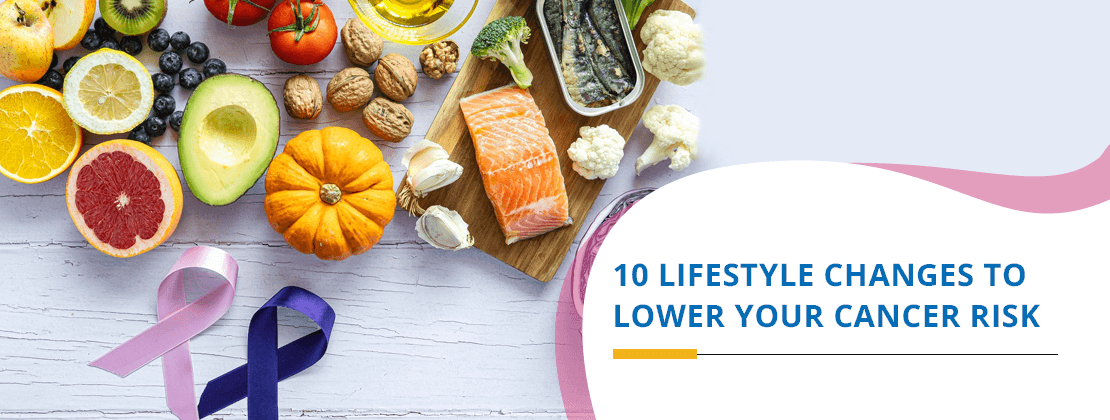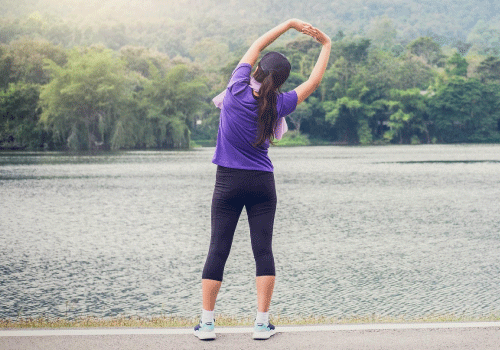
Home / Blog / 10 Lifestyle Changes to Lower Your Cancer Risk
Cancer remains one of the leading causes of death worldwide, but the good news is that many types of cancer can be prevented through healthy lifestyle choices. According to experts, about 30–50% of cancers could be prevented through healthy lifestyle modifications.
While significant progress has been made in treatments, such as chemotherapy, surgical oncology, radiation therapy, immunotherapy, and targeted therapy, prevention is always preferred.
A few simple adjustments in daily life can dramatically reduce cancer risk and enhance general well-being.
In this article, we shall discuss ten lifestyle changes that you can make to reduce the risk of cancer and lead a longer, healthier life.
Smoking is the single largest preventable cause of cancer worldwide. It is associated not only with lung cancer but also with cancers of the mouth, throat, oesophagus, bladder, etc.
Stopping smoking or never starting it at all is one of the most significant steps you can take toward cancer prevention. Even if you’ve smoked for a long time, it is still possible to reduce cancer risk by quitting this habit.
Tip: Seek support programs or nicotine replacement therapies if you need help quitting.

Dietary choices may impact your health and cancer risk. An excellent immune system protects the body against cellular damage, so high consumption of fruits, vegetables, whole grains, and lean proteins favours such an immune system.
Fibre-rich foods like beans and lentils help lower cancer risk, especially that of colorectal cancers. Additionally, limited consumption of processed food and red meat and a predominance of plant foods greatly reduce cancer risk.
Healthy Picks: Broccoli, berries, tomatoes, carrots, and green leafy vegetables.
Alcohol is a known risk factor for several types of cancer, including breast, liver, mouth, and colon cancers. The less alcohol you drink, the lower your cancer risk.
If you choose to drink, limit yourself to no more than one drink per day for women and two for men.
Fun Fact: Non-alcoholic beverages and mocktails are trending and can be just as satisfying without the risks!

Exercise not only contributes to healthy weight maintenance but also contributes significantly to the maintenance of the hormonal balance in the body. Regular exercise helps prevent chronic inflammation and hormone imbalance, which increase the risk of cancer development.
Aim for at least 150 minutes of moderate-intensity exercise or 75 minutes of vigorous activity every week. Some examples of such activities would be walking, swimming, cycling, or practising yoga.
Bonus: Physical activity can also help improve your energy levels and mood.

Being overweight or obese is linked to a higher risk of several cancers, including breast, colon, kidney, and pancreatic cancers. Being overweight can lead to chronic inflammation and hormonal imbalances that promote cancer development.
Combining a balanced diet with regular physical activity is key to reaching and maintaining a healthy weight.
Tip: Even losing a small amount of weight (5–10% of your body weight) can have significant health benefits.
Skin cancer is likely the most common cancer and also the most preventable.
Most importantly, protect your skin with shade, protective clothing, and broad-spectrum sunscreen with an SPF of 30 or higher. Avoid indoor tanning beds, which can also increase your cancer risk.
Quick Reminder: Reapply sunscreen every two hours, especially after swimming or sweating.
Some viruses, such as human papillomavirus (HPV) and hepatitis B, can cause increased cancer risk.
Vaccination for these viruses can aid in cancer prevention in the cervix, liver, and elsewhere. Discuss with your healthcare provider the vaccine recommendations for your age and lifestyle.
Pro Tip: Vaccines are an important part of cancer prevention — not just for kids but for adults too.
Early detection saves lives. Regular cancer screenings, such as mammograms, colonoscopies, and Pap smears, can catch cancer early, when it’s most treatable. In some cases, screenings can help detect precancerous conditions before they turn into cancer.
Action Step: Work with your doctor to create a personalised screening schedule based on your risk factors.
Cancer Screening Packages at HCG: Cancer Screening – HCG Hospitals
Exposure to harmful chemicals at home or work, like asbestos, radon, and certain pesticides, can increase cancer risk. Exposure to hazardous chemicals is linked to blood cancers, bone cancers, and other types of cancer. In such cases, timely diagnosis and interventions like blood cancer treatments or bone cancer treatments are essential.
Take precautions by using protective gear, ensuring proper ventilation, and following safety guidelines when handling hazardous materials.
Simple Change: Switch to eco-friendly cleaning products and test your home for radon.
Chronic stress doesn’t directly cause cancer, but it can lead to unhealthy behaviours such as smoking, overeating, or drinking alcohol, all of which increase cancer risk.
Managing stress through activities like meditation, deep breathing exercises, journaling, or hobbies can promote a healthier lifestyle and indirectly contribute to cancer prevention.
Feel-Good Tip: Even spending 10 minutes a day outdoors can reduce stress levels significantly.
Lowering your cancer risk doesn’t mean making huge changes overnight. Small, consistent lifestyle changes for cancer prevention can have a significant cumulative impact.
Refraining from tobacco consumption, eating a balanced diet, exercising regularly, limiting alcohol, and protecting yourself from the sun are all powerful tools in your cancer prevention toolbox. These choices not only lower cancer risk but also boost your energy, improve your mood, and enhance your overall health.
Cancer prevention is in your hands more than you might realise. While no method guarantees 100% protection against cancer, taking proactive steps through healthy lifestyle changes can greatly reduce your cancer risk.
It’s never too early or too late to start making positive changes. Remember, every small decision you make toward a healthier life is a step toward a future with lower cancer risk. Prioritise yourself today for a healthier, brighter tomorrow.